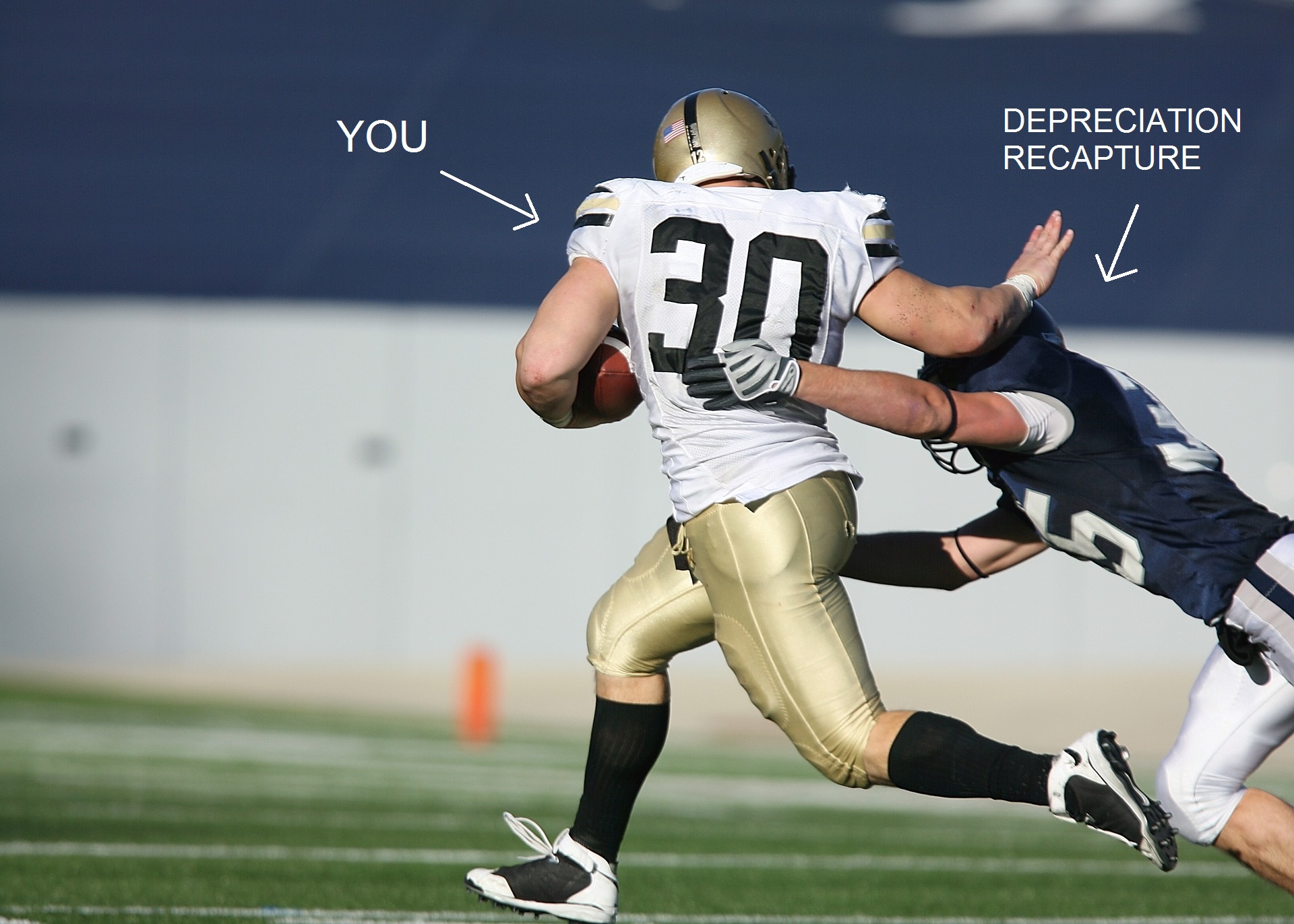So now that you know the ins and outs of depreciation and how great it can be for landlords, let’s take a closer look at the downside: depreciation recapture.
Disclaimer: For the purposes of this article, we are only going to discuss depreciation recapture in relation to residential real property, AKA unrecaptured section 1250 gain.

So, What Is It?
Depreciation recapture is the process of reporting (and paying tax on) a gain on the sale of an asset that has previously been depreciated.
What’s the reasoning behind it?
Well, the IRS figures that if you’re going to reap the benefit of lowering your taxable ordinary income year after year by claiming depreciation expense against your rental income, then they might as well get a piece of the pie when you get rid of the property.
Yuck.
How big of a piece? Up to 25% of the “recaptured” portion.
Double yuck.
That’s like someone inviting you to a dinner party and giving you a nice meal and wine only to ask for 25% of the cost on your way out.

But what if you refused the food and wine? It doesn’t matter! You’d still have to pay up to 25%. And you wonder why no one goes to the IRS’s dinner parties…
Common Misconception
Myth: You can choose not to claim depreciation and, if you decide to forego depreciation, you won’t be subject to depreciation recapture in the future. They can’t recapture something that was never taken, right?!
Wrong.
Fact: You can choose not to write off depreciation expense against your rental income – that part is true; technically, you are not required to claim it. But doing so will not avoid depreciation recapture.
While claiming depreciation expense as a deduction is technically a choice, depreciation itself is not a choice.
What I mean by that is the IRS will treat your property as having been depreciated even if you chose not to claim depreciation expense.
That’s right – you will still be subject to depreciation recapture and could owe tax even if you never received the benefit of depreciation expense. So, make sure you always take depreciation!
Example Scenarios
I’m going to bring back the facts from my previous example scenario:
- Purchase price of rental property = $325,000
- Land allocation = $50,000 (not depreciable)
- Building allocation = $275,000
- Yearly depreciation = $10,000 (remember, residential rental property is depreciated over 27.5 years)
Let’s assume you sold the property after three years.
First, we need to calculate your basis in the property:
Basis = purchase price + improvements – accumulated depreciation, which is a fancy term for what you’ve depreciated to date.
Your basis, in this example = $325,000 ($275,000 building + $50,000 land) + $0 (we’re assuming no improvements in this case for simplicity’s sake) – $30,000 (depreciation on the building for the three years you’ve held the property; zero depreciation for land) = $295,000.
Second, we will need to calculate the gain using the following formula:
Gain = sale price – basis
Finally, we will have to determine the nature of the gain (capital gain vs. depreciation recapture).
Scenario #1 – Sale Price > Basis; Total Gain > Accumulated Depreciation
Sale price = $340,000
Original purchase price = $325,000
Basis = $295,000
Your gain in this scenario is $45,000 ($340,000 – $295,000).
But remember how you’ve depreciated $30,000 over the 3 years you’ve held the property?
Enter depreciation recapture.
$30,000 of the $45,000 gain must be “recaptured” and taxed at ordinary rates up to a max of 25%. The remaining $15,000 is taxed at the preferential long-term capital gains rates.
For example, if you’re in the 32% bracket, you’d pay $10,320 in taxes ($30,000 x 25%, plus $15,000 x 18.8%, which is the long-term capital gains rate plus the 3.8% net investment Income tax). If depreciation recapture wasn’t in the picture (for example, if you had this exact gain from the sale of stock), you’d pay 18.8% on the full amount of the gain, or $8,460.
Scenario #2 – Sale Price < Basis; Total Gain < Accumulated Depreciation
Sale price = $305,000
Original purchase price = $325,000
Basis = $295,000
This example is a little counterintuitive. You’re selling the property for less than you bought it for but you still have a gain. That’s because the gain/loss is calculated using your basis, not the original purchase price.
Your gain here is $10,000 ($305,000 – $295,000).
Since you’ve depreciated $30,000 over 3 years, the full $10,000 gain would be subject to depreciation recapture.
Scenario #3 – Sale Price < Basis
Sale price = $275,000
Original purchase price = $325,000
Basis = $295,000
In this scenario, you have a loss of $20,000 ($275,000 – $295,000).
There’s good news and bad news:
Bad news – you sold at a loss. Good news – no depreciation recapture.
Scenario #4 – Sale Price = Basis
Sale price = $295,000
Original purchase price = $325,000
Basis = $295,000
When the sale price equals your basis, you have no gain or loss and, therefore, no depreciation recapture.
How to Avoid Depreciation Recapture
As fun as all this recapture talk sounds, wouldn’t it be nice to avoid it?

You may have heard of a 1031 exchange, commonly referred to as a like-kind exchange. In a nutshell, the 1031 exchange process allows you to defer the gain—meaning postpone the tax liability generated as a result of the gain to a future date—on the sale of your property if you take the proceeds from the sale and reinvest them into like-kind property. For example, if you sell one rental property and buy another with the proceeds from the sale of the first one.
Not only does a 1031 exchange defer capital gains, it defers depreciation recapture, too.
The topic of 1031 exchanges deserves its own article, so I won’t dive into it any further here, but if you are considering selling your property in the near future, I highly recommend doing some research on 1031 exchanges and talking to a pro before you sell to help guide you through the process.
It’s one of the most valuable tax-saving strategies in the entire Code!
Wrap Up
The tax on depreciation recapture related to real property can be as high as 25%, as opposed to the lower long-term capital gains rates.
Don’t be fooled – choosing to forego depreciation expense while you hold the property will not save you; the IRS will treat it as if you claimed it anyway.
The only true way to get around depreciation recapture (other than selling at a loss) is to do a 1031 exchange and defer your taxes for as long as possible.
Most importantly, if you’re not qualified to do so, don’t try to tackle these obstacles by yourself. Without the proper planning and execution, you can wind up in a hole you didn’t even know existed or completely miss out on an opportunity for huge tax savings.
Aiola CPA, PLLC is a 100% virtual CPA firm, specializing in tax planning and preparation for real estate investors. See more at www.aiolacpa.com



